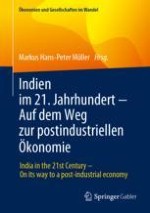2024 | OriginalPaper | Buchkapitel
2. Indiens Exzeptionalismus, kognitive Souveränität und Vernakularisierung
verfasst von : Rahul Peter Das
Erschienen in: Indien im 21. Jahrhundert − Auf dem Weg zur postindustriellen Ökonomie
Verlag: Springer Fachmedien Wiesbaden
Aktivieren Sie unsere intelligente Suche, um passende Fachinhalte oder Patente zu finden.
Wählen Sie Textabschnitte aus um mit Künstlicher Intelligenz passenden Patente zu finden. powered by
Markieren Sie Textabschnitte, um KI-gestützt weitere passende Inhalte zu finden. powered by
